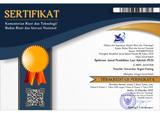Constructivism Thinking and Implementation in Non-Formal Education
 ),
), (1) Universitas Negeri Padang
(2) Universitas Negeri Padang
(3) Universitas Negeri Padang
 Corresponding Author
Corresponding Author
DOI : https://doi.org/10.24036/spektrumpls.v12i3.123741
Full Text:
 Language : en
Language : en
Abstract
Philosophy is a branch of science that has several realistic, fundamental aspects, values and knowledge that are fundamental in the birth of logical reasoning, critical thinking that discusses the universe, ethics, religion, life, knowledge and truth. In its development there are several schools of philosophy, one of which is the philosophy of constructivism, a thought where contructivism learning is seen as an active process that involves interaction between individuals and their environment. This concept can be applied in non-formal education in various ways. Constructivism thinking in non-formal education emphasizes the importance of active participation and meaningful learning for learners. This approach enables them to develop critical thinking, problem-solving and adaptability skills that are relevant in real life. The implementation of constructivism in non-formal education involves the important role of facilitators or teachers in creating an environment that encourages learners to actively participate and interact in the learning process. Teachers should apply methods that focus on learners, encourage critical thinking, and inspire them to formulate and analyze problems independently.
Keywords: Philosophy, Thought, Constructivism, Non-formal education
References
Abbeduto, L. (2004). Taking Sides: Clashing Views on Controversial Issues in Educational Psychology. Mc Graw-Hill/Dushkin. https://books.google.co.id/books/about/Taking_Sides.html?id=USFrHgzsgo0C&redir_esc=y
Azzahri, F., & Lestari, E. (2023). Penerapan Metode Pembelajaran Kooperatif Pada Pelajaran Pendidikan Agama Islam. Invention: Journal Research and Education Studies, 3(3). https://doi.org/10.51178/invention.v3i3.1265
Bruner, J. S. (1999). The Process of Education, A Landmark in Educational Theory. Harvard University Press.
Driscoll, M. P. (2000). Psychology of Leraning for Instruction. Allyn & Bacon.
Fitri, R., Jamaris, J., & Solfema, S. (2022). Teori Belajar Konstruktivisme dalam Perkuliahan Keanekaragaman Tumbuhan. Jurnal Pedagogi Hayati, 6(1).
Herliani, H., Boleng, D. T., & Maasawet, E. T. (2021). Teori Belajar dan Pembelajaran. Lakeish.
Ibda, F. (2015). Perkembangan Kognitif: Teori Jean Piaget. INTELEKTUALITA, 3(1).
Johnson, D. K. (2010). Footprints in the Sand: Radical Constructivism and the Mystery of the Other. Constructivist Foundations, 6(1).
Khoerunnisa, P., & Aqwal, S. M. (2020). Analisis Model-Model Pembelajaran. Fondatia, 4(1). https://doi.org/10.36088/fondatia.v4i1.441
Masgumelar, N. K., & Mustafa, P. S. (2021). Teori Belajar Konstruktivisme dan Implikasinya dalam Pendidikan dan Pembelajaran. GHAITSA : Islamic Education Journal, 2(1).
Maulana, I., & Leonard, L. (2018). Pendekatan Konstruktivisme dengan Strategi Pembelajaran Tugas dan Paksa. Seminar Nasional Dan Diskusi Panel Multidisiplin Hasil Penelitian & Pengabdian Kepada Masyarakat. https://proceeding.unindra.ac.id/index.php/dispanas2018/article/viewFile/62/53
Nazir, M. (2017). Metode Penelitian. Ghalia Indonesia.
Nerita, S., Ananda, A., & Mukhaiyar, M. (2023). Pemikiran Kinstruktivisme dan Implementasinya dalam Pembelajaran. Jurnal Education and Development, 11(2).
Nurfatimah Ugha Sugrah. (2019). Implementasi Teori Belajar Konstruktivisme dalam Pembelajaran Sains. Humanika, Kajian Ilmiah Mata Kuliah Umum, 19(2).
Rangkuti, A. N. (2014). Konstruktivisme dan Pembelajaran Matematika. Jurnal Darul Ilmi, 02(02).
Saidah, Z. (2021). Pendidikan Berbasis Konstruktivisme dalam Meningkatkan Kebermaknaan Belajar di Era Digital. Wahana Islamika: Jurnal Studi Keislaman, 7(2).
Solichin, M. M. (2021). Paradigma Konstruktivisme dalam Belajar dan Pembelajaran. uta Media Publishing.
Sugiyono, S. (2017). Metode Penelitian Kuantitatif Kualitatif dan R&D. Alfabeta. https://doi.org/10.1017/CBO9781107415324.004
Suparlan, S. (2019). Teori Konstruktivisme dalam Pembelajaran. Islamika, 1(2). https://doi.org/10.36088/islamika.v1i2.208
Suparno, P. (1997). Filsafat Konstruktivisme dalam Pendidikan. Kanisius.
Trianto. (2007). Model-model Pembelajaran Inovatif berorientasi Kontruktivistik. Prestasi Pustaka.
 Article Metrics
Article Metrics
 Abstract Views : 89 times
Abstract Views : 89 times
 PDF Downloaded : 30 times
PDF Downloaded : 30 times
Refbacks
- There are currently no refbacks.

This work is licensed under a Creative Commons Attribution-NonCommercial 4.0 International License.



